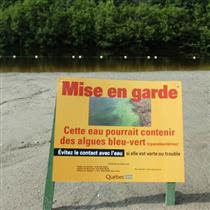Lakes require tougher measures
Published: Wednesday, June 06, 2007
The Gazette
Lakes are to Quebec what sunshine is to Florida: a large and reliable part of our collective geographic identity.
But 90 lakes in the Laurentians, the Eastern Townships, and elsewhere in Quebec were closed to swimmers and boaters last year, victims of blue-green algae infestations caused by too much phosphorus, both naturally occurring and man-made, in the water.
"Blue-green algae" sound harmless, even charming, like azure skies or emerald waters. But their other name, "cyanobacteria," is more blunt and properly alarming.
Protecting our water ecosystem is an imperative, both moral and economic, and when critics this week derided Quebec Environment Minister Line Beauchamp's $12-million plan to combat Quebec's algae problem as "noble" (politic-speak for useless), they were not all wrong. Twelve million is better than nothing, but it's not nearly enough.
The solution to this growing problem requires not only money. One component of the problem is dishwashing detergent, which still contains phosphates - chemicals Ottawa and Washington banned from laundry detergents and soaps 35 years ago to revive Lakes Ontario and Erie.
That measure saved those Great Lakes from a slow death. A good starting point for Beauchamp, then, would be to ban phosphate from dishwasher soaps, at least near lakes. Detergent-makers could surely be persuaded - even ahead of a law - that they have, say, one year to start making phosphate-free dish dish cleaners.
It's not rocket science, nor would it be expensive. In fact, Bloc Quebecois environment critic Bernard Bigras proposed this yesterday, urging that Ottawa ban phosphates outright, but an environment-department spokesperson said the federal government has no plan to do so.
There are plenty of other urgently needed measures, some of which Beauchamp's plan address in part, like planting 2.2 million trees near lakes to prevent run-off. Pell-mell tree-cutting by forestry companies and farmers, has eroded the natural barriers that lakes and rivers need as a buffer, and a couple of million seedlings won't make up for many millions of old-growth trees. So controlling clear-cutting in such well-defined areas would ease the problem. Nature provides exemplary equilibrium, and we disturb that balance at our peril.
Environmentalists rightly note phosphorus-laden fertilizers are sold to farmers to spread on their land, some of it at the waterline. That's also eminently stoppable, as is the problem of overloaded septic tanks that leak effluent into the water cycle.
Clean water is a priority. We rely on water for drinking water, for boating, swimming, to sit by on a hot weekend at the chalet. If we can't fix something so well within reach, how are we going to tackle the much thornier problems of the global environment?
Click here to read this artile at the Gazette.






Aucun commentaire:
Publier un commentaire